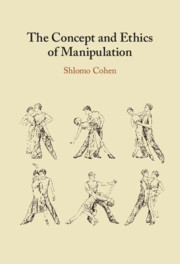Book contents
- The Concept and Ethics of Manipulation
- The Concept and Ethics of Manipulation
- Copyright page
- Dedication
- Contents
- Preface
- Part I The Concept
- Part II The Ethics
- Chapter 4 The Moral Status of Manipulation
- Chapter 5 Manipulation and Respect for Persons
- Chapter 6 On Manipulation in Politics
- Bibliography
- Index
Chapter 6 - On Manipulation in Politics
from Part II - The Ethics
Published online by Cambridge University Press: 10 April 2025
- The Concept and Ethics of Manipulation
- The Concept and Ethics of Manipulation
- Copyright page
- Dedication
- Contents
- Preface
- Part I The Concept
- Part II The Ethics
- Chapter 4 The Moral Status of Manipulation
- Chapter 5 Manipulation and Respect for Persons
- Chapter 6 On Manipulation in Politics
- Bibliography
- Index
Summary
A realistic utopia is a utopia that respects basic constraints imposed by the Human Condition. This chapter explains why some kinds of political manipulation are not bad or wrong at all, and would accordingly remain operative in a realistic political utopia. The legitimacy of manipulation is first demonstrated with respect to five categories of the non-deliberative dimensions of political life: mobilizing, participation, negotiation, ruling, and ensuring stability. It is then demonstrated with respect to political deliberation itself. All of this applies to manipulation’s function in the two faces of democratic politics: cooperation and competition. The need for the “social lubrication” functions of manipulation is especially acute in politics, given the intractability of the coordination challenges on a society-wide scale. Specifically, manipulation is, at certain junctions, a necessary tool for overcoming motivational obstacles to the flow of political information in a way conducive to rational persuasion. In such ways manipulation is integral to the very idea of a functioning democracy.
Keywords
- Type
- Chapter
- Information
- The Concept and Ethics of Manipulation , pp. 197 - 222Publisher: Cambridge University PressPrint publication year: 2025

